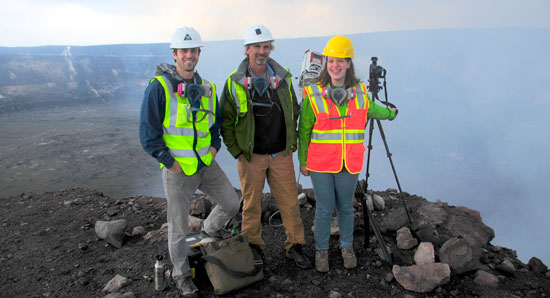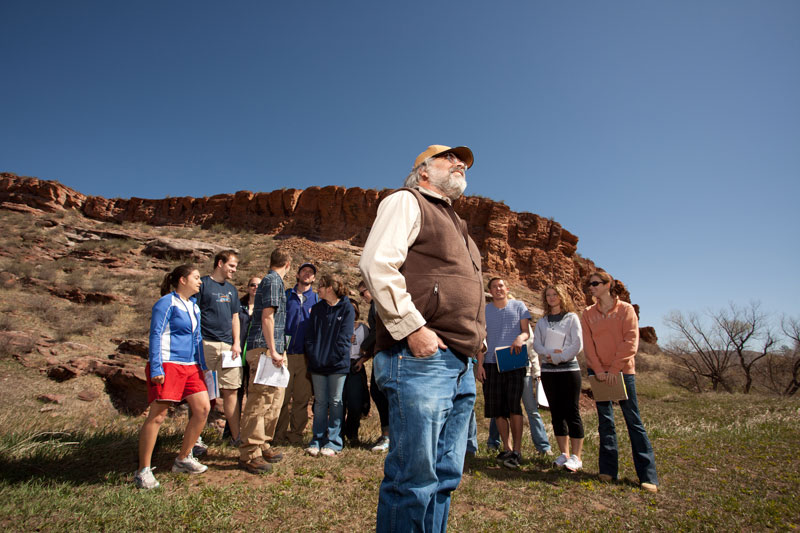Please note: This program is not currently accepting applications for admission.
Flexible, Focused and Multidisciplinary
UNC enables you to customize the Master of Arts in Earth Sciences to fit your academic and professional goals. You’ll gain high-level skills and expertise across multiple disciplines, enabling you to advance your career in education, earth and atmospheric sciences, energy, resource management and many other fields.
Situated at the intersection of mountains and plains, UNC provides you with extraordinary opportunities to conduct field research. You’ll also work with outstanding faculty who can help you customize a master’s program that builds on your strengths and fits your objectives. With our broad selection of graduate courses, diverse faculty and a wide variety of research specializations, UNC offers you the flexibility to find the perfect niche in the earth sciences.
Degree Options
M.A. in Earth Sciences: Thesis Option
Choose this option if you’d like to focus on a specific discipline or subject area within the earth sciences. With a broad foundation of interdisciplinary coursework, you'll choose and deeply investigate a research question, gaining hands-on experience in gathering evidence, conducting field work and analyzing data. You’ll present your findings in an original thesis to complete the program.
Take the next step! Explore courses, contact information and admission requirements.
M.A. in Earth Sciences: Non-Thesis Option
With this option you'll deepen your knowledge across multiple earth science disciplines. With our broad range of elective courses, you can customize your studies to fit your interests and professional needs. You’ll also choose, develop and complete a graduate research in collaboration with your research advisor.
Take the next step! Explore courses, contact information and admission requirements.
Your Future in Earth Sciences
UNC’s Earth Sciences M.A. program strongly supports career advancement in STEM education, energy development, natural resource management, environmental regulation, hydrology and many other fields. The program offers particularly good preparation for K-12 teachers and community college instructors. National policymakers have placed high priority on improving STEM education, creating strong demand for highly qualified STEM teachers. You can also pursue opportunities in Colorado’s energy sector, which has strong activity both in fossil-based and renewable energy sources.
Consider UNC’s M.A. in Earth Sciences if you want to:
- Conduct independent research in earth sciences
- Deepen your content knowledge across multiple earth science disciplines
- Become a STEM educator
- Begin or advance a career in an industry related to the earth sciences
You’ll learn:
- Research methodology, field investigation and data analysis leading to research document
- Oral and written presentation
- Deep content expertise in one or more earth science disciplines
Sample courses:
- Introduction to Earth Science Research
- Groundwater Geology
- Ore Geology
- Paleoclimatology
- Oceanography
- Geomorphology
- Astronomy
Beyond the Classroom
Both the thesis and non-thesis options of the Earth Sciences master’s degree provide you with research and fieldwork experience. You’ll enjoy fascinating opportunities at UNC, which lies within easy reach of numerous world-class physical environments, including the Rocky Mountains, Great Plains and Great Basin. There’s no better place to gain a broad, interdisciplinary education in the earth sciences.
Where can your degree take you?
- Community college instruction
- Ph.D. programs in geosciences
- Environmental regulation
- K-12 education
- Managerial or supervisory positions in earth sciences industries or agencies
Ready for what's next? Here's what you need to know.
If there's anything else we can do, be sure to connect with us. We're only a shout away.
Still not completely sold? We understand. Here's more information on costs and funding and how to apply.




